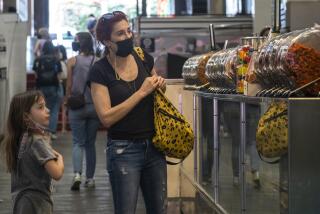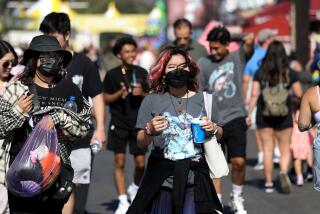Coronavirus threatens to thin the ranks of police and firefighters on the front lines
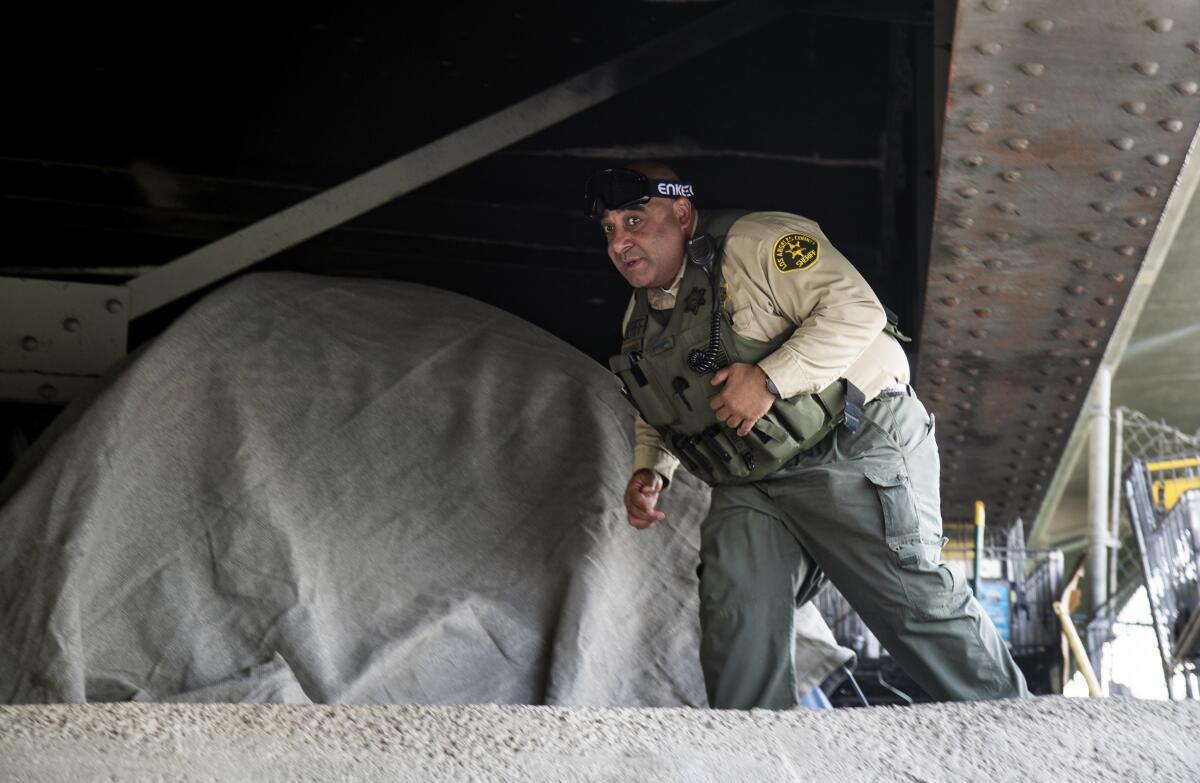
- Share via
As the coronavirus outbreak ravaged a nursing home in Kirkland, Wash., it also hit the local fire department hard.
No firefighters tested positive for the virus. But nearly a third of the 95-member department had to go into quarantine after coming to the aid of coronavirus patients.
Faced with an escalating number of infected people, police and fire departments can quickly become overwhelmed as more first responders are taken out of commission, creating staffing nightmares. Masks and other protective equipment are in short supply worldwide and could potentially run out as first responders care for patients and then need a new set.
The toll is starting to be felt in Los Angeles County, with more than 140 confirmed coronavirus cases and more announced each day.
Six L.A. firefighters, three L.A. County sheriff’s deputies and several L.A. County firefighters were quarantining themselves at home after assisting coronavirus patients. A supervisor in the Los Angeles Police Department’s Pacific Division tested positive for the virus but is expected to fully recover.
While other Americans work from home, police, firefighters and paramedics must continue to respond to 911 calls, including those involving suspected coronavirus patients. Lifesaving measures like CPR require direct contact with patients and their bodily fluids.
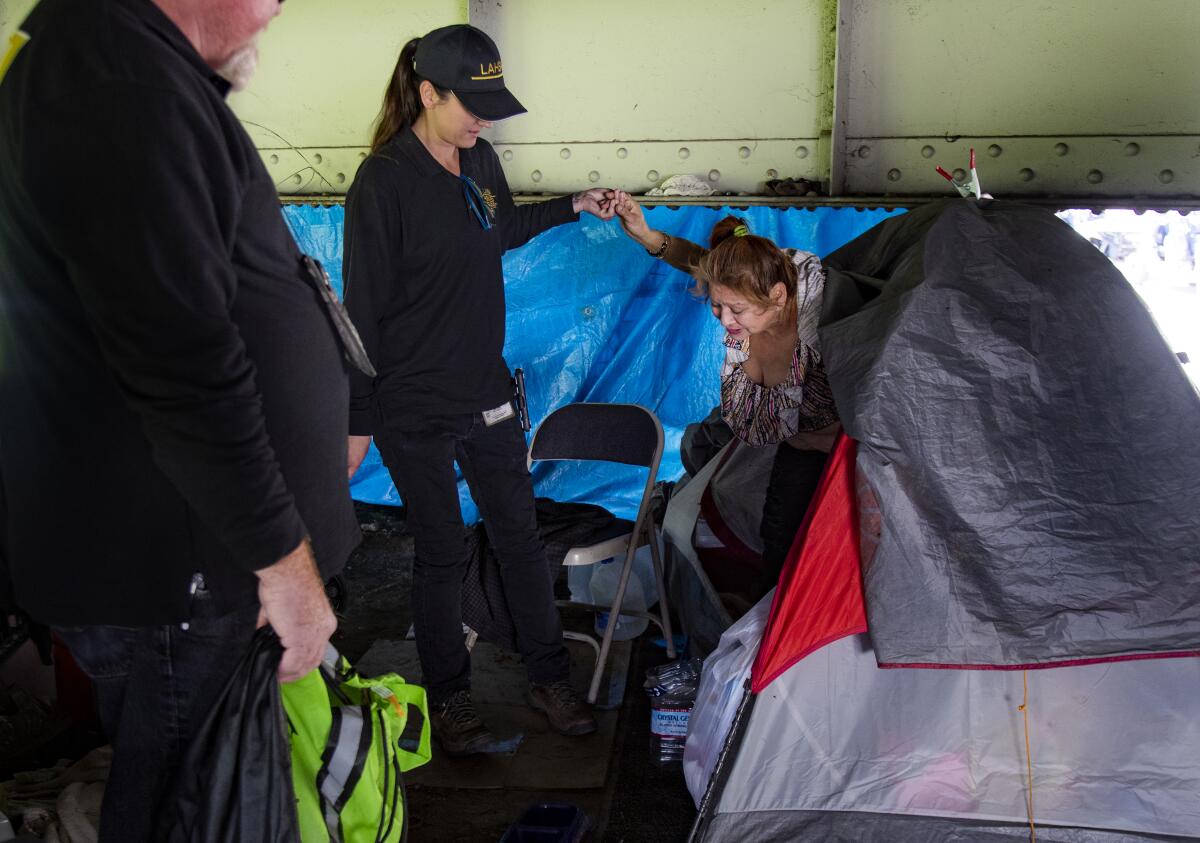
For police, arresting suspects, patting them down, giving them a ride to jail and providing emergency medical treatment all involve hands-on contact and possible exposure to blood and saliva.
To protect their officers, some police agencies are trying to reduce contact with the public. The LAPD has closed the front desks at its 21 stations, asking residents to email instead.
Both the LAPD and the L.A. County Sheriff’s Department are cutting back on arrests, letting nonviolent offenders off with a citation to free up officers for other tasks and to reduce the number of people in county jails, where the virus could spread quickly.
At the same time, with normal routines upended and people jostling for food at supermarkets, both agencies have assigned more officers to street patrol, including hundreds of LAPD detectives who normally investigate crimes.
Orange County sheriff’s deputies are taking reports over the phone when possible and will not respond to most noninjury traffic collisions.
Agencies are also ramping up their protective gear for first responders. Dispatchers are asking 911 callers about symptoms and travel history so firefighters know whether to don protective masks and gowns. Sometimes, one firefighter approaches while others hang back. L.A. County sheriff’s deputies are using sanitizing wipes to give their patrol cars an extra cleansing.
In San Jose, where 10 firefighters have tested positive for the coronavirus and 77 have been quarantined, every patient is assumed to be coronavirus-positive. The lead firefighter approaches wearing full protective equipment, including a gown, P-100 respirator, goggles and gloves.
Daniel Linskey, who was chief of the Boston Police Department during the 2013 marathon bombing, said police and fire agencies need to plan for worst-case scenarios — for example, by finding hotels to host first responders under quarantine.
“We have to have a plan for the police station or jail being compromised,” said Linskey, now the managing director and head of security risk management at Kroll and a fellow at the Duff & Phelps Institute. “What happens if 14 people in the jail come down with the virus? Where do we quarantine 300 prisoners, or do we do it on site?”
Despite the dangers, many police officers and firefighters say they are not overly concerned about the virus. This is the job they signed up for, they say.
“I don’t think most officers are very worried about it,” said Lt. Jay Hom, who oversees the LAPD’s emergency management section. “It’s just like any other virus — swine flu, SARS. We’ve got typhus, typhoid, tuberculosis out there.”
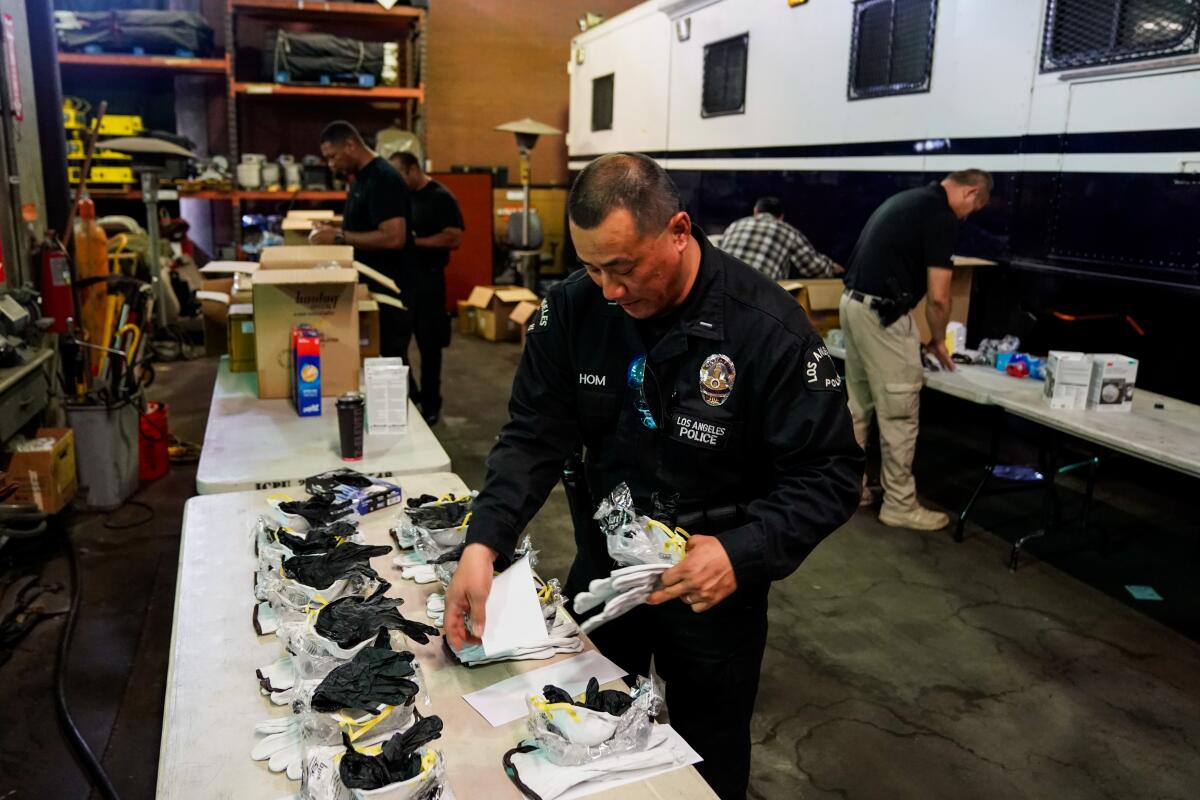
A week ago, Hom led a team of officers stuffing plastic bags with goggles, N-95 masks and gloves to protect themselves against the coronavirus.
About 7,000 patrol officers and others who work in the field were to receive a kit. The department already had 8,000 N-95 masks in stock for the upcoming fire season. But the masks are intended to be used only once. Amid a global shortage, an order for more masks is unlikely to be fulfilled until at least July, Hom said.
If extreme equipment shortages and quarantines of officers come to pass, the crisis will have entered a new realm, said LAPD Assistant Chief Horace Frank, who is overseeing the department’s coronavirus measures.
“Is it a concern? Yes,” Frank said. “What we can’t do is allow fear to paralyze us.”
Linskey, the former Boston police chief, said that if enough officers are out of commission, many incidents, other than the most urgent, would need to be handled by phone. A police chief could end up driving a patrol car.
Some precautions to limit contact with the public could start now, Linskey said, such as pulling over drivers only for egregious violations and letting others off with a warning delivered through a car window.
Above all, Linskey said, police need proper equipment so they feel protected from the virus — something that the shortage of protective masks has thrown into doubt. If they don’t feel safe, they might pull back on making arrests or getting physically close to people who need help.
“If they don’t have a mask, they’re not going to rush in there, and that could be life or death for someone,” Linskey said.
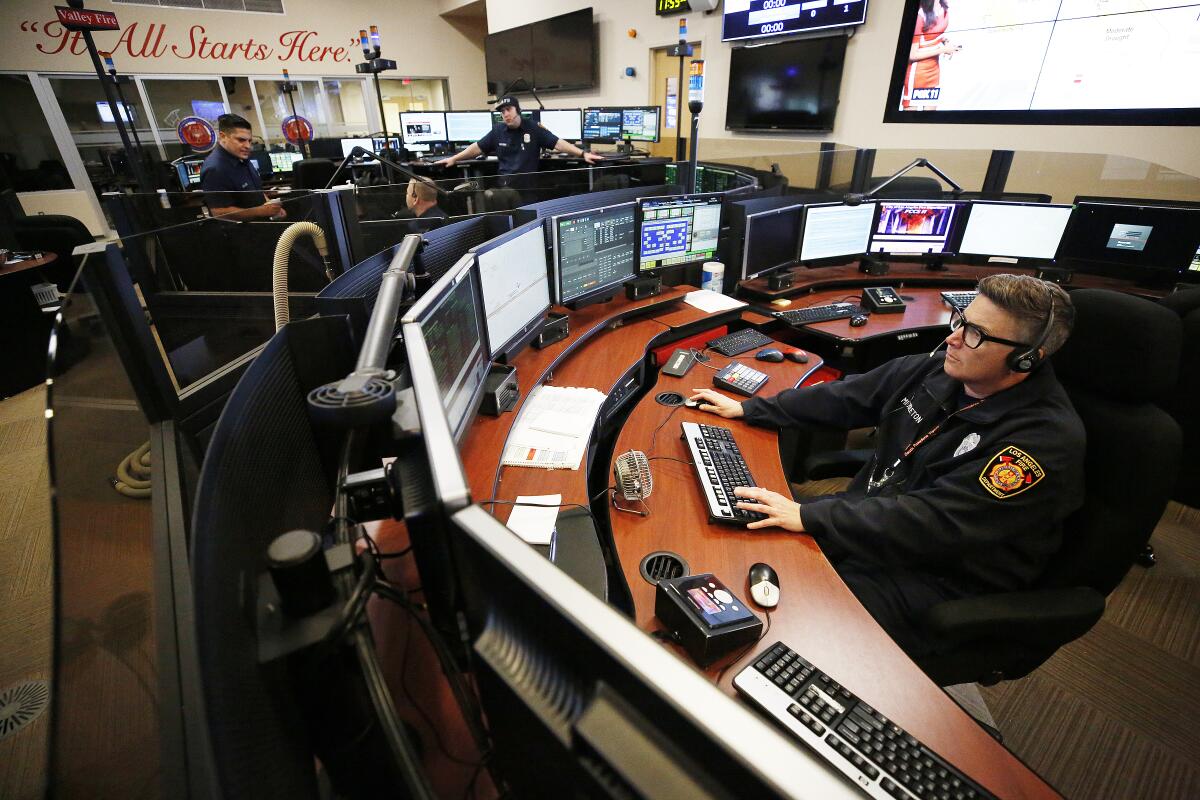
At L.A. Fire Department headquarters last week, officials exchanged elbow bumps and opened doors with their forearms to avoid touching the handles.
A spokesman, Capt. Erik Scott, demonstrated the equipment the department’s 3,400 firefighters and paramedics in the field already have on hand for fires and biohazards, including P-100 masks and surgical gowns.
On three occasions, LAFD firefighters have taken coronavirus patients to the hospital but did not have to be quarantined because they were wearing masks and gowns.
But a woman with respiratory issues at Union Station on March 2 was not flagged by a dispatcher as a possible coronavirus case because she had not traveled to hotspots for the disease. Six firefighters who assisted her were not wearing the full set of protective gear and were put into home quarantine on March 13, after she tested positive.
At a department gym, where employees have been instructed to wear long-sleeved garments to minimize sweat droplets and wipe down equipment after using it, much of the talk was about the virus, Scott said. But there was no panic.
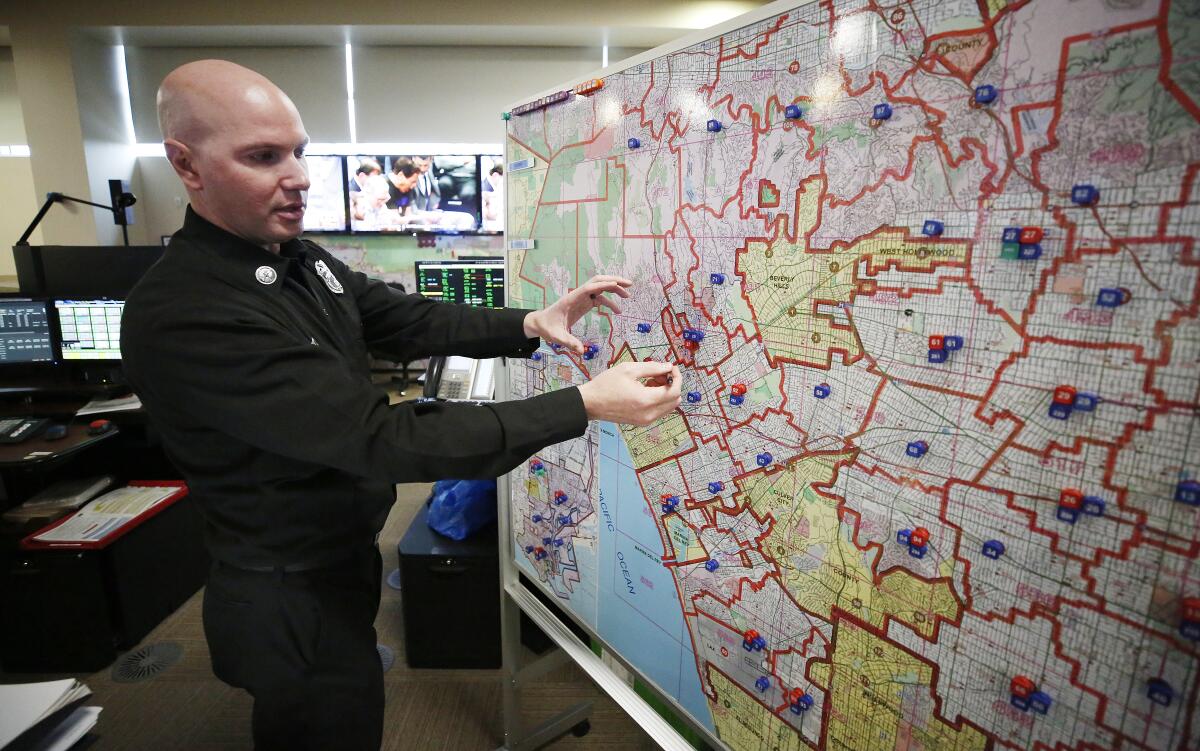
“They see some of the worst things possible, so they tend to take it in stride more than most,” Scott said.
Last Wednesday, Lt. Geoffrey Deedrick briefed L.A. County sheriff’s deputies on hygiene as they prepared to educate homeless people about the virus.
They should keep their distance, he said, refraining from their customary embraces and backslapping with people they had come to know well.
But heeding his own advice wasn’t easy. Along the San Gabriel River in El Monte, he ran into a homeless woman named Rebecca whom he hadn’t seen in years.
“You taught me a lot. I think about you often,” Deedrick said. They hugged.
Deputy Michael Tadrous wore an N-95 mask while driving his all-terrain vehicle — but to keep out dirt, not the virus.
He advised Belinda Romero, 57, not to share cigarettes or cups, handing her three bottles of water. Other outreach workers gave Romero some toiletries and told her to stay six feet away from people.
Tadrous is not scared of the virus. Nor, he said, are many homeless people.
“They’re just like, ‘We’ve been through worse,’” he said.
Times staff writers Rong-Gong Lin, Leila Miller, Soumya Karlamangla, Melody Gutierrez, Alex Wigglesworth and Ben Poston contributed to this report.
More to Read
Sign up for Essential California
The most important California stories and recommendations in your inbox every morning.
You may occasionally receive promotional content from the Los Angeles Times.
